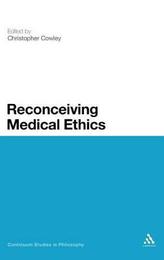
|
Reconceiving Medical Ethics
Hardback
Main Details
Description
This volume of original work comprises a modest challenge, sometimes direct, sometimes implicit, to the mainstream Anglo-American conception of the discipline of medical ethics. It does so not by trying to fill the gaps with exotic minority interest topics, but by re-examining some of the fundamental assumptions of the familiar philosophical arguments, and some of the basic situations that generate the issues. The most important such situation is the encounter between the doctor and the suffering patient, which forms one of the themes of the book. The authors show that concepts such as the body, suffering and consent - and the role such concepts play within patients' lives - are much more complicated than the Anglo-American mainstream appreciates. Some of these concepts have been discussed with subtlety by Continental philosophers (like Heidegger, Ricoeur), and a secondary purpose of the volume is to apply their ideas to medical ethics. Designed for upper-level undergraduates and graduate students with some philosophical background in ethics, Reconceiving Medical Ethics opens up new avenues for discussion in this ever-developing field.
Author Biography
Christopher Cowley is Lecturer in Philosophy at University College Dublin, Ireland. His previous publications include Medical Ethics: Ordinary Concepts, Ordinary Lives (2008).
ReviewsThere is a crying need for thoughtful work which reexamines the now rather sclerotic assumptions of academic philosophical medical ethics. Dr Cowley and his colleagues have met this need in fine style.This is an invaluable collection! -- Richard E. Ashcroft, Professor of Biomedical Ethics, Queen Mary, University of London, UK The unique character of this edition is indeed that the authors re-examine fundamental assumptions of medical ethics... This is really a refreshing - in the sense of 'foundational' - publication... The editor has achieved what he identified as his main purpose: this edition gives a place to reflections that were and are mainly absent in Anglo-American medical ethics. Each contribution reaches this high level and is therefore an excellent added value to international medical ethics today. I am convinced that this anthology, and the many references made in the contributions, can function as a bridge to a more philosophically based and foundational medical ethics in the future. -- Paul Schotsmans, KU Leuven * Ethical Perspectives *
|